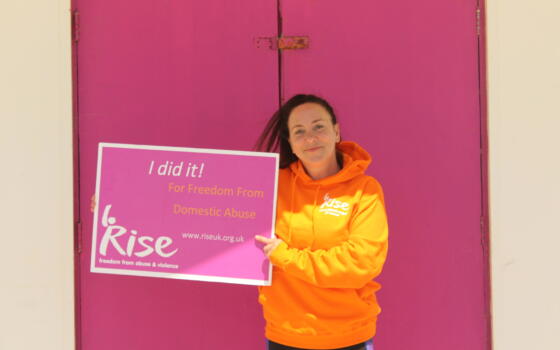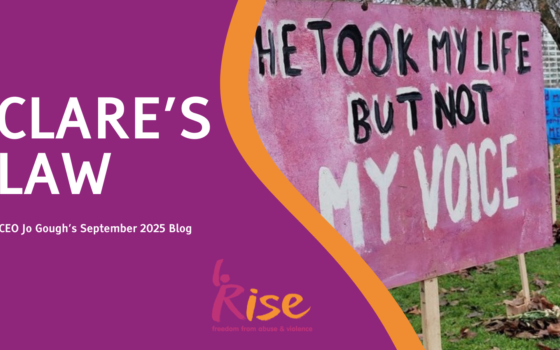"This is hard to write about, and for some hard, to read about. You may feel conflicted here, wanting to read this to support us and feel part of the movement, but needing to protect yourself. If this is difficult for you, I urge you to do what you need to feel safe and well, and leave any guilt aside. If that means not reading this, even just for today, it will be here for you another day.
In our work at RISE, we know that Domestic Violence and Abuse can be fatal. UN Statistics for 2023, which were released in 2024 - 25 years after the 25th of November was established as the International Day for the Elimination of Violence Against Women - estimate that approximately 51,100 women and girls across the world were killed by their intimate partners or other family members during 2023. That's 140 women and girls killed, each day. Here in the UK, where the Femicide Census reminds us that 'Men’s violence against women is a leading cause of the premature death for women globally', on average, one woman is killed every three days.
These figures are only relatively recently available. The Femicide Census began in 2015, springing from a personal project called Counting Dead Women by Karen Ingala Smith. There is a lot I could say about the failure of the state to record this data, but ten years on, things are changing, slowly. After decades of advocacy from organisations like RISE we've started to see recognition of domestic and sexual abusers accountability for deaths that fall out of the definition of homicide like completed suicides and health conditions precipitated by abuse such as strangulation. You may have seen more in the news recently about other deaths relating to domestic abuse - including Roisin Hunter Bennett and Vanessa Hamilton, and Kiena Dawes.
In March this year, 2025, The Domestic Homicide Project reported that the number of victims of domestic abuse who completed suicide in England and Wales surpassed the amount of people killed by their partner for the second year in a row. More people died by suicide than homicide. This was reported by the BBC and the National Police Chiefs Council (NPCC) among many others.
The Domestic Homicide Project is a Home Office funded research project led by the NPCC and delivered by the Vulnerability Knowledge and Practice Programme (VKPP) in collaboration with the College of Policing.
Their 2024 report reveals that 262 deaths relating to domestic abuse were recorded in England and Wales between 1 April 2023 and 31 March 2024. These were:
- 98 suspected suicide following domestic abuse
- 80 intimate partner homicides
- 39 adult family homicides
- 28 unexpected deaths
- 11 child deaths
- 6 ‘other’ (where the victim and suspect lived together, but were not related or intimate partners
These figures are shocking and tragic. Every one of these numbers represents a life that should have been lived to the full.
If you have read this far I know you will likely feel as helpless as I often do but please take heart - this data is crucial as the report says to, 'improve understanding of risk indicators, victim, and perpetrator demographics.'
As CEO of a domestic and sexual abuse charity and part of a national and international network of grassroots activists I know that this is the data that evidences the importance of our work. This is the information we need to create the best support systems to prevent abuse and violence – the counting of these untimely deaths is painful but each of these lives will be honoured in our work every day. "
Watch the Vulnerability Knowledge and Practice Programme animation of key facts and statistics here.
Image used with permission of the DHP


